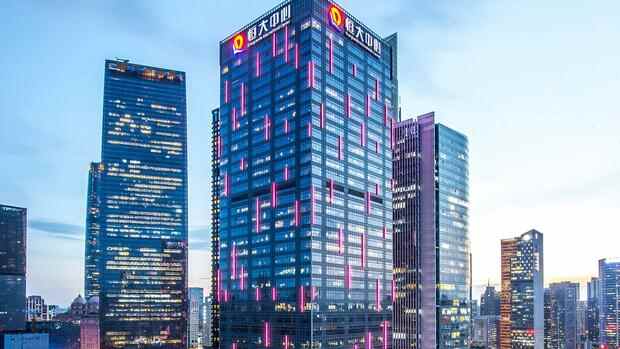Beijing The heavily indebted Chinese real estate developer Evergrande continues to move towards the abyss. As the first of the major international rating agencies, Fitch further downgraded Evergrande and its much smaller rival Kaisa on Thursday and officially declared the temporary default (“restricted default”). This rating is only one step above a complete failure.
In addition, the company did not respond to the rating agency’s request for confirmation of the coupon payments. “So we assume they haven’t been paid,” said Fitch. The rating agency Standard & Poor’s had already announced on Tuesday that it considered a payment default at Evergrande to be inevitable.
Evergrande himself has so far neither confirmed nor denied the expired grace period. The company is groaning under a mountain of debt of around $ 300 billion and has been dragging itself from one period to the next for months. Now Evergrande seems to be running out of air.
Top jobs of the day
Find the best jobs now and
be notified by email.
The feared panic mood on the international financial markets did not materialize on Thursday, however. The stock exchanges in Shenzhen, Shanghai and Hong Kong were already closed when the announcement came from Fitch. And the stock markets in Europe and the USA were trading slightly in the red because of the general corona uncertainty. It will be exciting to see how the Chinese stock exchanges start trading on Friday morning.
Fear of the “Lehman moment” is decreasing
Evergrande is the epicenter of a major quake that has struck the entire Chinese real estate sector. The shocks were triggered by measures taken by the Chinese government to get a grip on excessive debt and speculation. Real estate developers and financiers are now being restricted.
With a view to Evergrande, the government had recently signaled very clearly that there would be no state rescue operation, but at the same time ensured that the crisis group received support in reducing the risks and negotiating with creditors from home and abroad.
Most market strategists therefore no longer believe that Evergrande could be China’s “Lehman moment” – based on the insolvency of the US investment bank of the same name, which triggered the international financial crisis in 2008 because many participants were not clear about the global interdependencies at the time. In comparison, there is currently little systemic risk in China’s banking system, said William Russell, senior equity specialist at Allianz Global Investors in Hong Kong. Other experts made similar statements.
The Evergrande case could, however, lead to foreign investors staying away from the Chinese bond market in the future if the risks seem too incalculable to them. The first signs can be seen above all in the market for Chinese junk bonds, i.e. for bonds from companies with poor credit ratings.
The corresponding bond index has plummeted by more than 30 percent since mid-September. In the meantime it was even 37 percent in the red, so it has already recovered somewhat – and the recovery continued on Thursday. The risk premium, i.e. the yield gap between Chinese junk bonds and US government bonds, was recently a good 21 percentage points.
Chinese bonds from companies with good credit ratings have also suffered. The losses are moderate with a peak of minus 2.5 percent, and the risk premiums are not excessive at 1.7 percentage points.
There are no signs of Evergrande in European or American corporate bonds. Prices have also fallen slightly and, in return, returns and risk premiums have risen. However, this is due to the increased inflation rates and the slow change in monetary policy of the major central banks.
“Investors will now focus on whether and how the other property companies will service their high-yield bonds in the future,” says Carsten Roemheld, capital market strategist at the fund provider Fidelity International. Investors now wanted to get an impression of how things are in the real estate market in China.
Kaisa, a much smaller competitor to Evergrande, was also downgraded by Fitch on Thursday. Kaisa failed to repay its $ 400 million senior debt due on December 7, the rating agency said in a statement. There is no grace period for repayment. The Hong Kong stock exchange had already suspended trading in Kaisa shares on Wednesday after the first indications of a default.
Reuters news agency reported that Kaisa management will shortly reach a confidentiality agreement with investment bank Lazard advising a group of bondholders. This will lay the foundation for negotiations on refinancing and loan deferrals.
Even before Fitch was released, authorities reiterated that Beijing will not save Evergrande. China’s central bank chief Yi Gang said in a pre-recorded video message at a seminar on Hong Kong’s future as an international financial center that Evergrande’s risks were a “market operation” that would be “properly handled according to the principles of the market and the rule of law.”
More: China and the Evergrande shock: “The time to make money with real estate is over”

